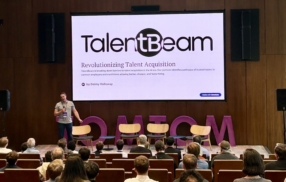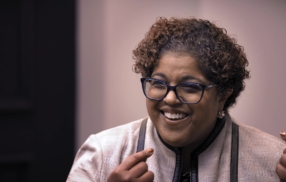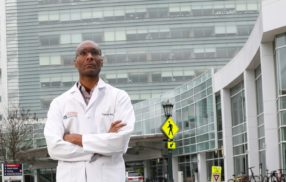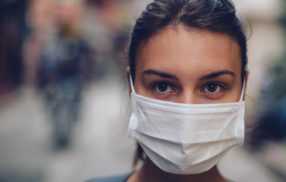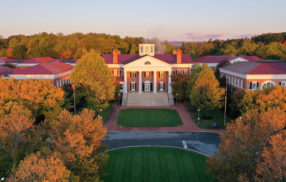
Critical Care and Infectious Disease Specialist: How Darden Exec MBA Is Helping Him Lead During COVID-19 Crisis
By Dave Hendrick
Like his peers in the University of Virginia Darden School of Business Executive MBA Class of 2020, Dr. Taison Bell’s world has been upended by the global coronavirus pandemic. As a critical care and infectious disease specialist and director of the medical intensive care unit at the UVA Health System, Bell is a leader in the rapidly evolving response to the pandemic, a role that involves trying to ensure adequate resources, advising on treatment and prevention, and, of course, tending to patients.
Bell described the whirlwind of recent weeks as something of a de facto capstone project to his time as a Darden student, putting lessons in operations, entrepreneurship and communications into practice at critical junctures.
Bell recently shared thoughts on the pandemic, including what everyone needs to know and why health care may be never be the same.
Read Part 2 of the two-part discussion below. Click here to read Part 1 of the discussion, which focused on critical information everyone should know about preventing the spread of coronavirus and what health care providers are doing to prepare.
You and your colleagues are on the front lines of this epidemic. How are you and your coworkers holding up?
It’s definitely different to go to work every day. My days are just jam-packed now. Charlottesville and the Commonwealth of Virginia, in general, is an interesting area right now, where our cases have just started to fill up. We’ve seen how this has played out in many different settings in China, Europe, New York, California and Seattle, and in many other places. So we can kind of anticipate what may happen, but there’s a big unknown in how severe is it going to be here.
We have a lot of preparation going on, we’re trying as hard as we can, and I think in a week or two when people actually start to get very symptomatic from it, once we have that wave of people who are coming in sick, we’ll know what we’re dealing with.
Right now, there’s a lot of uncertainty and there’s a lot of angst, not knowing what’s to come. We’re under the stress everyone else is under. We’re not going out. Our kids are home from school and people we know are getting laid off or going on furloughs. And some of our workforce is getting sick, as well.
It feels like the calm before the storm, like you heard that a tsunami is coming and you’re in the pathway, but right now you don’t see anything. It’s very unnerving, and we’re just kind of waiting to see what will happen. We’re trying to get our plans reinforced and learn from the missteps that other health systems have taken.
I understand you are involved in a process to create protective masks using a 3-D printer. What can you tell us about that?
We have ongoing efforts locally to procure personal protective equipment, but we’ve seen how the supplies just run out in the supply chain. They can’t keep up. In addition to being able to procure what may be laying around, there are a lot of collaborative efforts from the UVA engineering school to come up with innovative manufacturing solutions.
These aren’t going to be medical grade and cleared by the FDA, but if we use the right combination of materials and good manufacturing technique, we can have something that works just as well and be able to use that now and ask for permission later.
The [Centers for Disease Control] said on their website that health care workers, in a pinch, if there are no masks around, can use bandanas and scarves to tie around our face. We can certainly do better than that.
We’re trying to forecast ahead and think about what to do if we completely run out.
We’re working on trying to manufacture eye protections. We’re also looking at cloth masks but with different sort of materials to see what may work, balancing breathability and comfort along with efficacy.
Your Executive MBA experience has been dramatically altered by the pandemic, with all classes now delivered virtually. How are you and your classmates reacting to the dramatically changed circumstances?
Darden has become a very interesting place for me right now. We were already doing a lot of distance and online learning, so that was not a big deal for us.
But my medical skillset is in critical care and infectious disease, and I’m the only person here [at UVA Health] with that combination of skills, so this pandemic has consumed me.
Luckily, I have understanding faculty and leadership at Darden. I can’t thank them enough for their understanding. They’re also proactively reaching out to support me, and they’ve been a valuable resource.
I would have not wanted it to play out this way, but everything I’m doing right now ties directly into what I’ve learned from Darden.
When we were first having high-level leadership meetings for how we were going to respond to the crisis, things like our operations and our supply chain came up, and my lessons from Operations applied directly to that as we were trying to troubleshoot.
Our effort to manufacture personal protective equipment, I have a few Darden classmates pulled into that effort, because I wanted good people who I knew could help coordinate. So [Class of 2020 Executive MBA students] Andrew Harris and Tiffany Pillifant, who are both in my class, are helping me with the effort to coordinate the manufacturing effort.
But we’re talking about our lead times, our throughput, our distribution, marketing to get the word out, and it goes to all these different lessons I learned at Darden.
I’m also doing crisis communication. I’ve talked to a bunch of media outlets, in different forms, just to get the word out, because if people hear the messages and adhere to them, we have the potential to save lives.
So our communications class where our professors shared with us the Arthur Page principles of crisis communication, I pulled them up a few times and refreshed myself before talking to the media, and that’s been incredibly helpful.
I helped secure UVA as a clinical trial site for one of the experimental therapies that shows some promise, remdesivir. I took lessons from my entrepreneurship class and my experience co-founding a startup, Owl Peak Labs, with my co-founder and Darden classmate Tim Harvey, to pitch to the lead investigator to convince him that we were a good site to enroll patients after we had heard an initial no from lower down in the command chain.
We’ve talked about workforce talent management and how to motivate your workforce and get them to realize their full potential when they’re under moments of stress like this. We’re all going through this together, and learning how to recognize our vulnerability, share it and use it to motivate others — and that came from a Darden classroom.
So this experience, I would not have wanted it to come to a head like this, but I feel like as a leader in this crisis, I’m so much more prepared and better able to cope with what may happen because of the Darden experience.
What are you optimistic about right now?
Two main areas where I think I have hope coming out of this is that I think health care delivery is going to fundamentally change for the good. I think changes like telehealth, cutting some regulations and learning from our missteps here will no doubt make health care better going forward.
Then the second, which is a little more nuanced, is how we connect with each other on a human level. We know we’re social creatures. We like to be around each other, and we like to hug and kiss and shake hands and high five and be together. And we’re not doing those things right now. But the point I make to people is that socially distancing doesn’t mean you don’t care and that you can’t connect in other forms.
We have the benefit of technology now, so we can FaceTime and people are Zooming and doing conferences that way.
My son actually had a class meeting at 7:30 p.m. last night where his classmates all Zoomed in together and his teachers did a bedtime story. It was the cutest thing ever. But the point is that we can still be safe and be distant from each other, but find ways to meaningfully communicate with each other.
In times like this, we’re reminded of what is really important to us, and we can maintain those social bonds even in the midst of crisis and when we can’t be around each other. That’s another positive that’s going to come out of this, and I think we’ll be able to come together as a country in different sorts of ways to interact with each other going forward.
The University of Virginia Darden School of Business prepares responsible global leaders through unparalleled transformational learning experiences. Darden’s graduate degree programs (MBA, MSBA and Ph.D.) and Executive Education & Lifelong Learning programs offered by the Darden School Foundation set the stage for a lifetime of career advancement and impact. Darden’s top-ranked faculty, renowned for teaching excellence, inspires and shapes modern business leadership worldwide through research, thought leadership and business publishing. Darden has Grounds in Charlottesville, Virginia, and the Washington, D.C., area and a global community that includes 18,000 alumni in 90 countries. Darden was established in 1955 at the University of Virginia, a top public university founded by Thomas Jefferson in 1819 in Charlottesville, Virginia.
Press Contact
Molly Mitchell
Senior Associate Director, Editorial and Media Relations
Darden School of Business
University of Virginia
MitchellM@darden.virginia.edu


